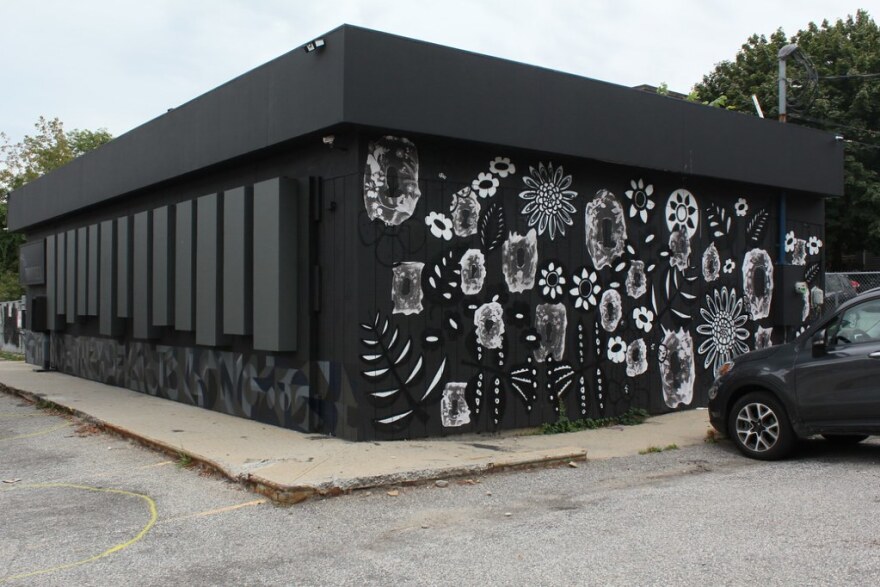A number of public art works have sprung up in Portland that were created to celebrate Black life and honor those who have been killed by police officers in recent years. One of those works is Ashley Page’s “In Memory of Those Taken,” which incorporates a series of portraits. Willis Ryder Arnold spoke with Page about the role of public art in a time of cultural reckoning on the issues of race and police brutality.
Three women are seated at a public table in Portland's Congress Square. Above them hang three banners flexing in the breeze, each bearing printed portraits of George Floyd, Breonna Taylor, Ahmaud Arbery, and other people of color killed by police.
One woman, who asked not to be identified, says the work is necessary. “This is a place from where lots of people from all over come, so people look up and they see it and they go, 'Remember!' And it reminds them that Black lives matter.”

Maine-based artist Ashley Page was actually in her hometown of Minneapolis, Minnesota the day that George Floyd was killed while being restrained by police. She says the energy of the moment, and the outrage that followed, demanded a response.
“What happened was the city erupted and buildings were burning," Page says. "People were out protesting and the energy was so tangible and you could just feel it.”
For Page that response came in the form of her project “In Memory of Those Taken” – creating the portraits and affixing them around Minneapolis. When Page returned to Portland earlier this summer she brought the project with her and added portraits of Mainers Isahak Muse and Chance David Baker.
Muse was a Muslim man shot by a white man who witnesses said had made racist statements in the past, and Baker was shot by a police officer while walking around with a BB gun. “I wanted to connect back to Portland," Page says, "and really try to talk about how this is happening everywhere."
Page says she found a new iteration for the work as the banners were hung in one of the city’s prominent public spaces. It's this kind of art, she says, that keeps the public’s attention trained on a national issue.
“It’s really the city and the park uplifting my voice, and the voice of others and the individuals who are depicted and really being like, ‘No, you cannot rip this down. This is staying and it’s here. And this is huge, and you can’t avoid this and you can’t look away.' ”
Page's is among a number of works that have sprung up across the city in recent months that observers say speak directly to issues of systemic racism and the violence suffered by people of color at the hands of police.

Artist Daniel Minter and two collaborators have turned a former gas station on Congress Street into a monument to people killed during centuries of violence against Black people. Minter is one founder of Indigo Arts, a studio dedicated to promoting artists of color in Maine.
He says Page's work struck him as something he was almost obliged to share. “We are seeking to heal ourselves," Minter says. "We are present. We care. We respond. And in doing so I hope it motivates others to care, to recognize that we are here, and to respond in the ways that they can.”
Minter says Page’s initial response to the killing of Floyd reflects the way that artists can best serve their audience and the larger public. “That work was necessary for her to do in order for her to get through the day. And upon doing that I think she felt the need to share that. That’s what artist’s do. We ask questions for ourselves, and we ask questions of the public.”
"In Memory of Those Taken" will be exhibited through the weekend.
Updated 5:06 p.m. August 28, 2020: An earlier version of this post had Page's name misspelled. We apologize for the error.
Originally published 8:00 a.m. August 28, 2020.



